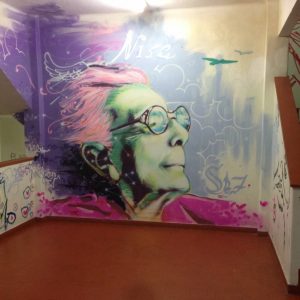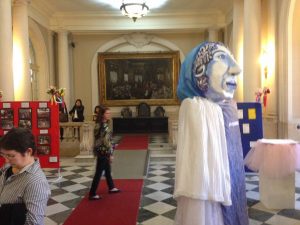Greetings from Rio de Janeiro!
Back in April, I shared some tips about how to prepare for summer research. Now we’re well into summer, and I’m on the ground in Brazil — conducting my thesis research on psychiatrist Nise da Silveira (1905-1999) and her legacy in Rio. I have made several trips to da Silveira’s psychiatric institute, particularly to visit the Hotel da Loucura — a creative space where artists and the institute’s clients come together to make theater. With two weeks of research completed, I thought I would share some summer research tips that have helped me so far.

1 – Plan in increments. For me, the most daunting — and most exciting — part of tackling a long-term project is the need for flexible and evolving goals. Especially for an ethnographic and interview-based project like mine, I cannot predict what will come up. So far, I have found it most useful to take things a week at a time. I make weekly objectives: attend one theater workshop, conduct two interviews, make a visit to da Silveira’s archives, etc. This allows me to break down the immensity of a two month long research project into smaller, reachable goals.
2 – Write something everyday. I am discovering something new everyday: about Rio, about the people I meet, about art’s ability to heal — and, of course, about Nise da Silveira. I keep a notebook with me everywhere I go, jotting down notes, observations, and questions as I sit on my daily bus home from the psychiatric institute. Back in my apartment, I use these notes to write a short journal entry on my computer: a 15-minute exercise that not only gets me thinking critically about my research experiences, but also produces material that may be used months down the road in my thesis.

3 – Engage people you don’t know. You never know who might be able to help you. When I arrived, the people of the Hotel da Loucura were occupying the plaza in front of a government building, playing music, staging a play, and advocating for a greater questioning of how we treat people with different mental capacities. Following a thought-provoking monologue by an older actress, I approached her to talk about her work. She ended up not only agreeing to sit down for an interview, but also to show me around the city. I learned that — while it may feel awkward! — engaging with strangers is one of a researcher’s greatest assets.
4 – Take time off. It’s summer! We do so much work at Princeton during the school year; we need to remember that this is also our time to relax. While it is important to get your research done, let yourself recharge, too. Read a book. Go to the beach. Sleep in. Your research will only be better if you’re taking care of yourself.
– Dylan Blau Edelstein, Humanities Correspondent

